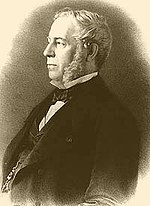Édouard Drouyn de Lhuys, Date of Birth, Place of Birth, Date of Death
TweetÉdouard Drouyn de Lhuys
French diplomatAbout Édouard Drouyn de Lhuys
- Edouard Drouyn de Lhuys (pronounced [edwa?? d?u?~ d??l?is]; 19 November 1805 – 1 March 1881) was a French diplomat.
- Born in Paris, he was educated at the Lycée Louis-le-Grand.
- The scion of a wealthy and noble house, he excelled in rhetoric.
- He quickly became interested in politics and diplomacy. He was ambassador to the Netherlands and Spain, and distinguished himself by his opposition to Guizot.
- Drouyn de Lhuys served as Minister of Foreign Affairs from 1848 to 1849 in the first government of Odilon Barrot.
- In Barrot's second government, he was replaced by Alexis de Tocqueville, and was appointed ambassador to Great Britain.
- He returned briefly as foreign minister for a few days in January 1851, and then returned permanently in the summer of 1852, becoming the first foreign minister of the Second Empire.
- He resigned his post in 1855, during the Crimean War, when the peace preliminaries he had agreed to in consultation with the British and Austrians at Vienna were rejected by Napoleon III. Drouyn de Lhuys returned to power 7 years later, in 1862, when foreign minister Édouard Thouvenel resigned over differences with Napoleon on Italian affairs.
- Drouyn was thus foreign minister in the lead-up to the Austro-Prussian War.
- He commented that, "the Emperor has immense desires and limited abilities.
- He wants to do extraordinary things but is only capable of extravagances." In the aftermath of that war, which was disastrous to French interests in Europe, Drouyn resigned and withdrew into private life
Read more at Wikipedia


 Date of Birth:
Date of Birth:  Place of Birth: Paris, Île-de-France, France
Place of Birth: Paris, Île-de-France, France